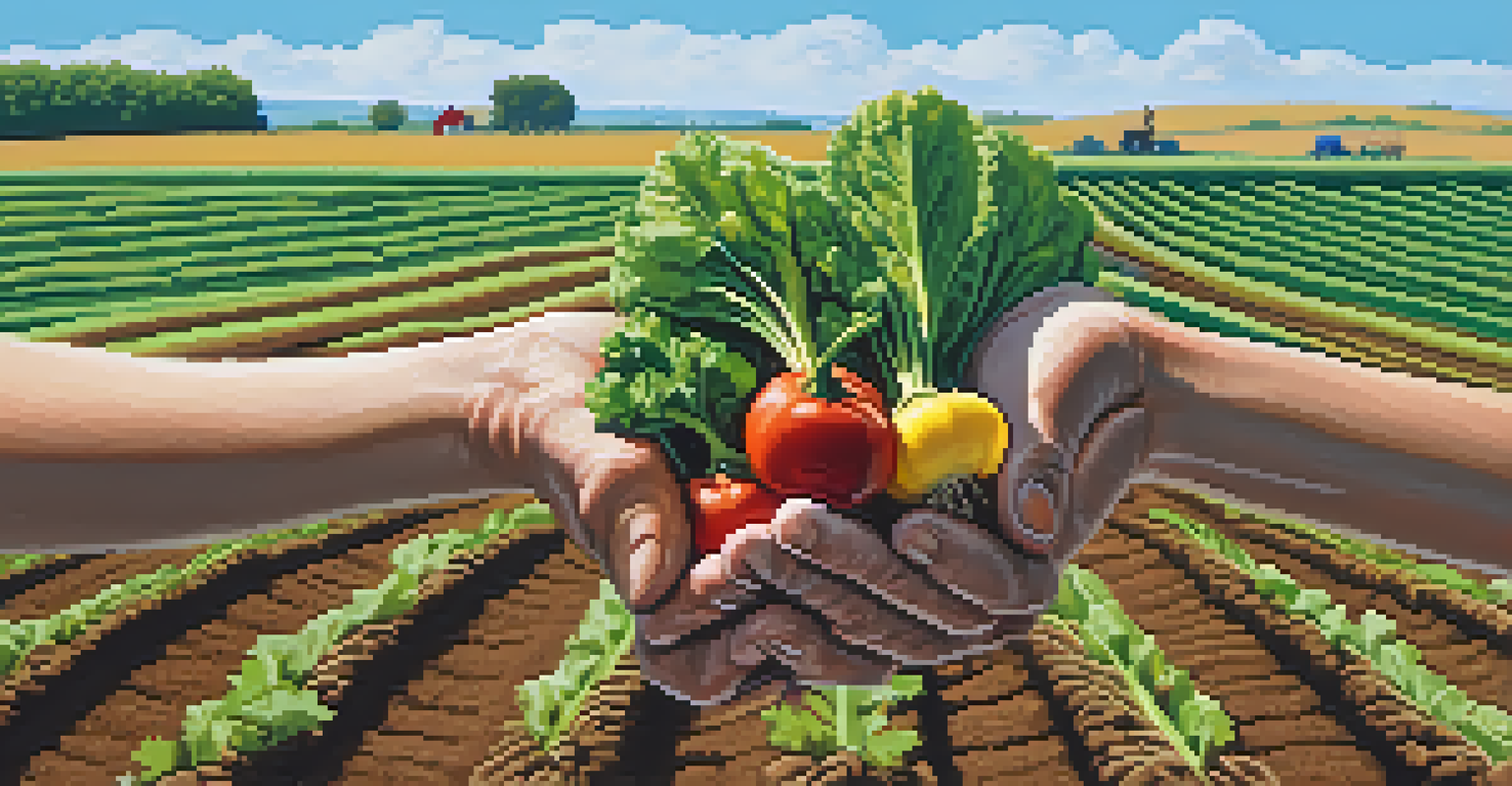Collaborations with Local Farmers: Enhancing Food Access

Understanding the Importance of Local Food Access
Access to fresh, nutritious food is crucial for community health and well-being. It affects everything from physical health to mental wellness and even economic stability. When communities lack access to healthy food options, they often rely on processed alternatives, which can lead to various health issues.
The food you eat can be either the safest and most powerful form of medicine or the slowest form of poison.
Local food access isn't just about availability; it's about creating sustainable systems that prioritize local agriculture. By supporting local farmers, communities can reduce their dependence on industrial food systems that often overlook quality and nutritional value. This shift can lead to healthier eating habits and stronger local economies.
Moreover, when people have access to fresh produce, they are more likely to incorporate fruits and vegetables into their diets. This can result in decreased rates of diet-related diseases, ultimately benefiting the community as a whole. Understanding the importance of local food access is the first step towards enhancing the overall health of a population.
The Role of Local Farmers in Food Systems
Local farmers play a vital role in building resilient food systems. They grow a diverse array of crops, which helps to maintain biodiversity and offers consumers a variety of choices. This diversity not only enriches diets but also contributes to the local economy by keeping money within the community.

Additionally, local farmers often employ sustainable practices that are better for the environment. By using methods such as crop rotation and organic farming, they help protect soil health and reduce reliance on chemical fertilizers and pesticides. This sustainable approach can lead to a healthier ecosystem overall.
Local Food Access Enhances Health
Access to fresh, local food significantly improves community health and well-being by promoting better nutrition.
Collaboration with local farmers also fosters relationships between producers and consumers. When people know where their food comes from, they are more likely to appreciate its value and make informed choices. This connection enhances community ties and encourages support for local agriculture.
Building Partnerships: Community and Farmers Unite
Creating partnerships between local farms and communities can significantly enhance food access. Programs like Community Supported Agriculture (CSA) allow residents to invest directly in local farms, receiving fresh produce in return. This not only provides farmers with a stable income but also ensures that families have regular access to fresh food.
When we support local farmers, we are investing in our communities and ensuring a sustainable future for all.
Collaboration doesn't stop at CSAs; local farmers can partner with schools and community organizations to supply fresh produce for meals and educational programs. By introducing children to healthy eating early on, we can instill lifelong habits that benefit their health and well-being.
These partnerships can also involve local businesses, which can support farmers by sourcing ingredients for their restaurants or stores. This creates a win-win situation where businesses can advertise their commitment to local sourcing, while farmers gain a reliable market for their produce.
Overcoming Barriers to Food Access
Despite the benefits of collaborating with local farmers, several barriers still exist that hinder food access. Economic factors often play a significant role, as many low-income families may struggle to afford fresh produce. Addressing these economic challenges is crucial for improving access to healthy foods.
Transportation can also be a barrier. In many areas, especially rural ones, public transport options are limited, making it difficult for individuals to reach farmers' markets or local farms. Solutions like mobile markets or community shuttles can help bridge this gap and ensure everyone has access to fresh food.
Farmers Strengthen Local Economies
Local farmers contribute to resilient food systems and economic stability by diversifying crops and employing sustainable practices.
Furthermore, there can be a lack of awareness about where to find local produce. Educating communities about the benefits of local food and providing clear information on how to access it can empower residents to make healthier choices. Awareness campaigns can be pivotal in transforming food access in these areas.
Innovative Solutions for Food Distribution
Innovative solutions are emerging to enhance food distribution from local farmers to communities. For instance, technology is playing a key role in connecting consumers with local producers through apps and websites. These platforms allow users to order directly from farmers, ensuring fresh produce is delivered right to their doorsteps.
Food co-ops and community markets are also gaining popularity as alternative distribution methods. They not only provide a space for local farmers to sell their goods but also foster a sense of community among shoppers. This model encourages people to buy locally while promoting social interaction and support for local businesses.
Additionally, initiatives like food hubs act as central points for aggregation and distribution, making it easier for farmers to reach larger markets. By streamlining the supply chain, food hubs can improve efficiency and increase the availability of local produce in various neighborhoods.
The Impact of Food Education on Community Health
Food education plays a crucial role in enhancing food access and promoting healthy eating habits. Programs that teach residents about nutrition, cooking, and the benefits of eating local can empower individuals to make informed choices. When people understand the impact of food on their health, they are more likely to prioritize fresh produce in their diets.
Workshops and cooking classes can demystify the process of preparing healthy meals using local ingredients. By providing practical skills and knowledge, these initiatives can help families stretch their food budgets while enjoying nutritious meals.
Education Boosts Food Choices
Food education empowers individuals to make informed dietary choices, fostering healthier eating habits within communities.
Moreover, food education can create a ripple effect within communities, as participants share their newfound knowledge with friends and family. This collective learning fosters a culture of health and well-being, ultimately leading to improved community health outcomes.
The Future of Local Food Collaborations
Looking ahead, the future of local food collaborations appears promising. As more communities recognize the importance of supporting local farmers, innovative partnerships will likely continue to grow. These collaborations can lead to increased food access, improved nutrition, and stronger local economies.
Sustainability will remain a central theme, as communities strive to create food systems that are environmentally friendly and economically viable. This focus on sustainability can inspire new generations of farmers and consumers to prioritize local food sources, fostering a deeper connection to the land.

Ultimately, the success of these partnerships depends on community engagement and support. By working together, we can create a future where everyone has access to fresh, healthy food, ensuring that local farms thrive and communities flourish.